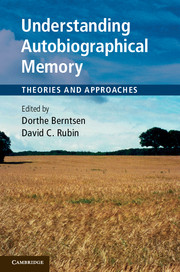Book contents
- Frontmatter
- Contents
- List of figures
- List of tables
- List of contributors
- Preface
- Acknowledgements
- 1 Introduction
- Part I Approaches to the study of autobiographical memory
- Part II Neural studies of autobiographical memory
- Part III Social and cultural aspects of autobiographical memory
- Part IV Development of autobiographical memory from infancy to old age
- Part V Evolution and basic processes of autobiographical memory
- Part VI Discussion
- Index
Part V - Evolution and basic processes of autobiographical memory
Published online by Cambridge University Press: 05 November 2012
- Frontmatter
- Contents
- List of figures
- List of tables
- List of contributors
- Preface
- Acknowledgements
- 1 Introduction
- Part I Approaches to the study of autobiographical memory
- Part II Neural studies of autobiographical memory
- Part III Social and cultural aspects of autobiographical memory
- Part IV Development of autobiographical memory from infancy to old age
- Part V Evolution and basic processes of autobiographical memory
- Part VI Discussion
- Index
Summary
Evolution and basic processes of autobiographical memory
The three chapters in Part V attempt to make theoretical and empirical connections between autobiographical memory (as most frequently studied) and other basic mental processes. All three chapters address relatively new topics of autobiographical memory research. Donald’s chapter discusses the development of autobiographical memory in an evolutionary perspective. Donald proposes that many nonhuman species are capable of episodic remembering when triggered by concrete cues in the environment, but are unable to initiate the recall process in a decontextualized and controlled fashion. It is primarily this ability for autocuing (strategic recall) which renders human autobiographical memory unique, according to Donald. Berntsen addresses the phenomenon of involuntary (spontaneously arising) autobiographical memories and proposes that such memories form a basic mode of remembering that may be evolutionarily earlier than the much more cognitively demanding (and much more studied) voluntary mode of accesing the past. The chapter by D’Argembeau reviews an accumulating amount of findings showing that the ability to remember the personal past and imagine the personal future is supported by many of the same cognitive and neural processes. D’Argembeau discusses the possible component processes underlying future thinking.
- Type
- Chapter
- Information
- Understanding Autobiographical MemoryTheories and Approaches, pp. 267 - 268Publisher: Cambridge University PressPrint publication year: 2012



